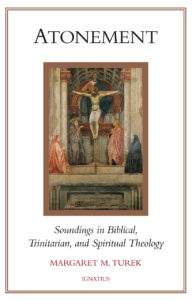Podcast: Play in new window | Download (Duration: 29:09 — 20.1MB) | Embed
Subscribe: Apple Podcasts | Spotify | Amazon Music | Android | Pandora | iHeartRadio | JioSaavn | Podchaser | Gaana | Podcast Index | Email | TuneIn | Deezer | Anghami | RSS | More

The Paternal Love of the Father – Atonement: Soundings in Biblical, Trinitarian, and Spiritual Theology
Discerning Hearts presents a series of conversations between Dr. Margaret Turek and Evan Collins about her book, “Atonement: Soundings in Biblical, Trinitarian, and Spiritual Theology.”
 You can pick up a copy of the book here:
You can pick up a copy of the book here:
An excerpt from the book:
“Our discussion until now has stressed that sin is committed by one who is “more than” a mere creature.38 Nevertheless, sin is the work of human freedom alone, and thus it should be dealt with by human freedom. Indeed, as we observed in our reading of the Old Testament, sin cannot be merely walked away from; it must be borne away, effaced, eliminated. Sin is borne away by being transformed or converted into its opposite. If sin is to be transformed into its opposite, then that which is the opposite of sin—filial love—must take up and bear sin away. But filial love can bear sin only insofar as filial love is willing to bear the effects of sin, primarily separation from the Father (in a word: God-forsakenness). And given the enormity of sin, its complete and definitive transformation calls for a filial love infinite in efficacy,39 capable of plumbing the Trinitarian proportions of sin. And there’s the rub: although the work of atonement must involve human freedom, human freedom alone cannot turn around the repercussions of rejecting the extension of the divine Father-Son relationship to and in human persons. Alone it cannot convert sin’s effects into material for the expression of a filial love infinite in quality that perfectly images—and thus perfectly glorifies—the Father’s passion of love in the face of sin. This can be accomplished only by the divine Son, who, taking up human freedom in his Incarnation, makes it the place in which a return of love—precisely in the form of an infinite filial love-suffering—can be made to God the Father.40 Atonement for the sin of the world, simply put, is the assertion of incarnate sonship against sin. Sonship takes sin upon itself—without ceasing to be itself—in order to transform sin into the suffering form of filial love, thereby annihilating it.”Turek, Margaret. Atonement: Soundings in Biblical, Trinitarian, and Spiritual Theology (pp. 85-86). Ignatius Press. Kindle Edition.
From the book’s description:
“This book presents the chief insights concerning the mystery of atonement in the works of four theological guides: John Paul II, Joseph Ratzinger/Benedict XVI, Hans Urs von Balthasar, and Norbert Hoffmann.
The author argues for the central importance and perennial value of a theology of atonement, even as she explains the modern aversion to it. The book’s central aim is to deepen our understanding of the biblical claim that God shows himself to be love precisely by sending his Son as atonement. “In this is love: not that we loved God, but that he loved us and sent his Son as expiation for our sins” (1 Jn 4:10).
The book develops a compelling vision of atonement as a process that originates from and is engendered by God’s own power to love. This vision not only takes account of the gravity of sin and its consequences but also provides a clear illumination of the wholly gratuitous, radically forgiving, passionate and powerful nature of God’s redeeming love for mankind. Distinct from the majority of theological accounts of atonement, which focus almost exclusively on the role of Christ, this book highlights the role of God the Father in the atoning mission of the Son.”

